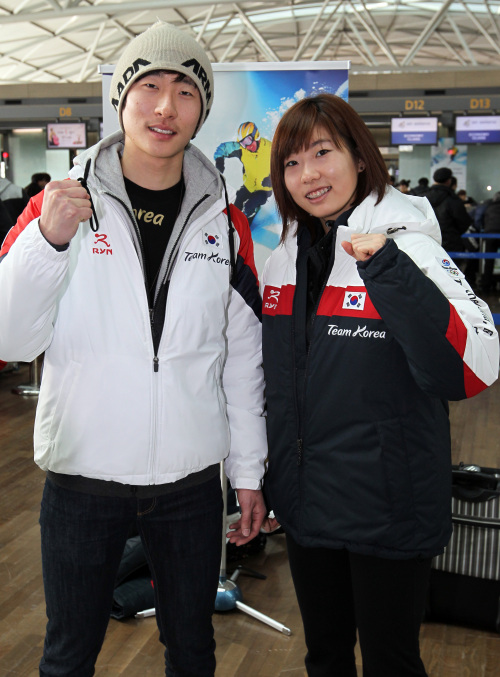Sandwiched by two traditional powers and an upstart nation poised to mount a challenge, South Korea will try to remain among the top three regional winter sports leaders at the upcoming Asian Winter Games.
The seventh edition of the quadrennial winter sports competition will kick off on Sunday in Kazakhstan and run until Feb. 6. Astana and Almaty, the country’s two largest cities, will split the opening and closing ceremonies, and the snow and ice events.
At the last Asian Winter Games in Changchun, China, in 2007, South Korea grabbed 33 medals, nine of them gold, to finish third behind China and Japan. Athletes and officials here have said the goal this time is to retain the third spot.
“We will try to put up our all-time best performance,” Kim Jong-wook, head of the South Korean delegation, said last week during the team launching ceremony. “The goal is to win at least 10 gold medals and finish among the top three.”
 |
EYE ON GOLD ― Korean national team freestyle skiers Seo Myung-joon (left) and Seo Jung-hwa pose before their departure to Kazakhstan on Thursday. (Yonhap News) |
South Korea’s best Winter Asiad came at home in the eastern province of Gangwon in 1999, when it grabbed 11 gold medals.
South Korea will likely need to match that total to stay inside the top three. And the key won’t be so much about trying to topple China or Japan as about holding off Kazakhstan.
Kazakhstan is expected to challenge China for supremacy, thanks to the addition of new events that could favor the host.
Eight gold medals are up for grabs in ski orienteering, a cross-country endurance race in which orienteering maps are used by competitors.
Bandy, another new event, is ball hockey played on ice with a football twist, involving 11 players per each team competing for two 45-minute halves. The sport awards one gold medal.
Meanwhile, some of South Korea’s strong events have been eliminated. South Korea won both men’s and women’s curling titles in 2007, but no stones will be thrown across the sheet this time.
Alpine skiing will not include the slalom and giant slalom either.
South Korean speed skater Lee Kyou-hyuk is the two-time defending Asiad champion in the men’s 1,000-meter race, but in Kazakhstan, he won’t get a chance at his third straight title because the distance isn’t part of the speed skating program.
Kim, however, said he was confident South Korean athletes would build on their record-setting performances from the Vancouver Winter Olympics a year ago.
In February last year, South Korea won six gold medals and 14 medals overall, its all-time high. It was also the first Winter Games where the country won gold medals in a sport other than short track speed skating, reaching the top of the podium in figure skating and speed skating.
Kim Yu-na, the gold medalist in ladies’ figure skating, is not entered at the Winter Asiad, as she is currently preparing for the world championships in Tokyo in March. But other gold medalists from Vancouver will be on hand to duplicate their Olympics success.
Speed skaters Lee Seung-hoon, Mo Tae-bum and Lee Sang-hwa will go after their first Winter Asiad gold medals. In Vancouver, Lee Seung-hoon won gold in the men’s 10,000 meters and silver in the 5,000 meters, becoming the first Asian to win an Olympic gold in a long-distance event. Lee Sang-hwa was the women’s 500m champion and Mo won the men’s 500m. Veteran Lee Kyou-hyuk recently won his fourth title at the World Sprint Speed Skating Championships, an event that combines scores from the 500m and 1,000m events. He will be a threat in the 500m in Kazakhstan.
Korea will also look to short trackers to keep doing what they’ve been doing ― winning plenty of gold medals. Since the Asian Winter Games began in 1986, South Korea has won 45 gold medals and 25 of them have come from short track.
(Yonhap News)








